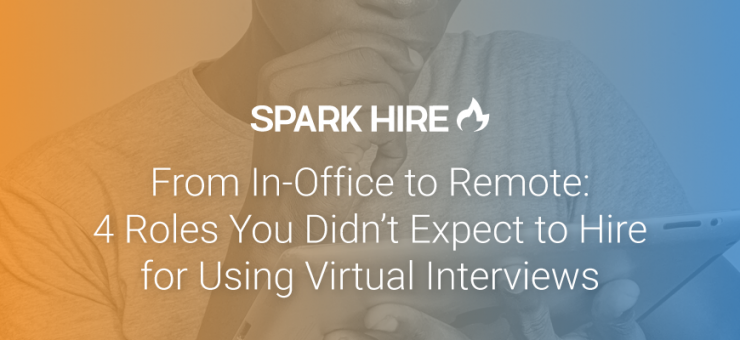In 2019, 74% of employees already considered flexible work the new norm. (International Workplace Group). And, in the past 10 years, 83% of businesses had introduced a flexible workspace policy or were planning to adopt one.
As of early 2020, FlexJobs reports there are 4.7 million, or 3.4% of the population, people working remotely. And since then, this number has only grown.
There are a number of roles companies have accepted as “traditional” remote roles. Certain IT roles and sales roles, for example, have become established work-from-home positions. However, there are many roles leaders are hesitant to move off-location and shift to using virtual interviews.
There are some leaders, though, who recognize the capabilities of their employees in a remote setting, even in non-traditional work-from-home roles. Rahul Vij, CEO of WebSpero Solutions, for example, believes even a role as traditional as HR can be fully-equipped to work remotely with the right tools. Consequently, hiring for other atypical remote roles becomes a more efficient and effective process.
“Hiring managers can easily swap out initial face-to-face interviews with telephone and video interviews,” Rahul shared with us.
He continued, “With the use of virtual interviews, it becomes easier to vet out potential employees for a role. In fact, interviewing them at their place of comfort often reveals a more authentic version of the plausible employee. This makes it easier to have them test out their services and skills without the added cost of transportation.”
Here are just a few non-traditional remote roles companies are hiring for today that you can use virtual interviews to hire for in the future:
User experience researcher
 We recently hired a full-time user experience researcher in a remote capacity. We had a hard time finding someone qualified for a full-time user experience researcher role in NYC. All the best candidates were joining the big tech companies.
We recently hired a full-time user experience researcher in a remote capacity. We had a hard time finding someone qualified for a full-time user experience researcher role in NYC. All the best candidates were joining the big tech companies.
Someone applied for our role from Texas, and was so good in the interview we decided to roll the dice and see if she could work effectively remotely. Her quality of work and communication has exceeded our expectations that now we’re considering hiring additional product roles remotely.
It suddenly expands our candidate pool, and being based in NYC, gives us the opportunity to
save on costs.
Neal Taparia, Founder of Solitaired
Accountant
 We had a team of five in-office accountants that were taking care of our finances and accounting department. Now, even though our team is working remotely, all our accounting tasks are still streamlined.
We had a team of five in-office accountants that were taking care of our finances and accounting department. Now, even though our team is working remotely, all our accounting tasks are still streamlined.
They have paper-free work, so the restriction to come to the office daily is unnecessary. They work on accounting software that has necessary core features, including cloud storage, collaboration, and project management.
If we continue hiring remote employees in the future for this role, we would have access to a broader pool of applicants. We can hunt talent worldwide instead of restricting ourselves to a town, city, or even country.
Gintaras Steponkus, Marketing Manager at Solid Guides
Customer service and marketing
 At first, I was resistant to move our customer service and marketing roles remotely. It feels very important for these positions to be able to communicate with the rest of the company and take advantage of the nature of an on-site workplace, but they’ve been doing quite well working remotely.
At first, I was resistant to move our customer service and marketing roles remotely. It feels very important for these positions to be able to communicate with the rest of the company and take advantage of the nature of an on-site workplace, but they’ve been doing quite well working remotely.
In fact, I’d say our customer service and acquisition reps are doing even better from home. Without the hectic office environment, they’re able to focus completely on the customer or client. And because they’re not surrounded by co-workers, the person on the other end of the line isn’t getting feedback making them feel like everything’s too loud and busy for the worker to pay attention.
Dan Bailey, President of WikiLawn












